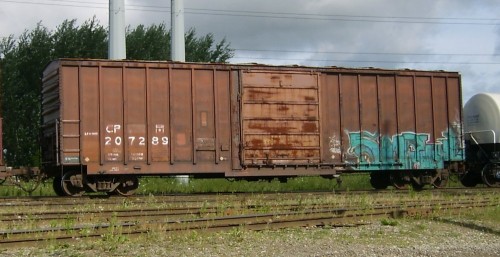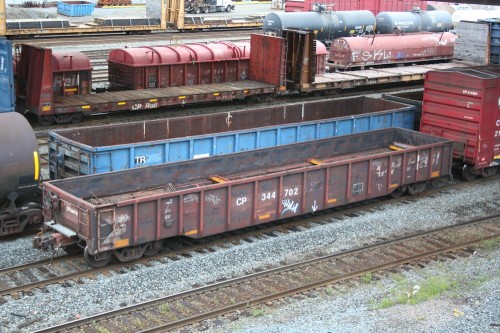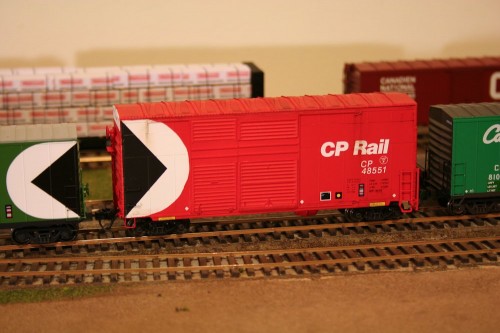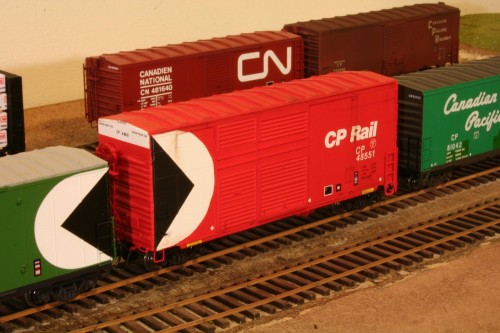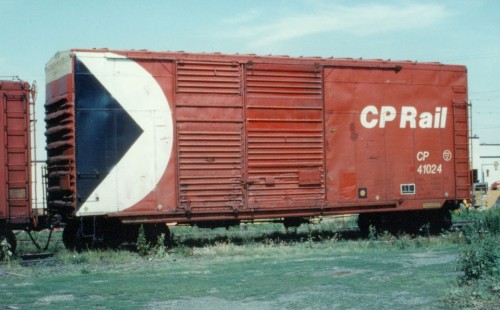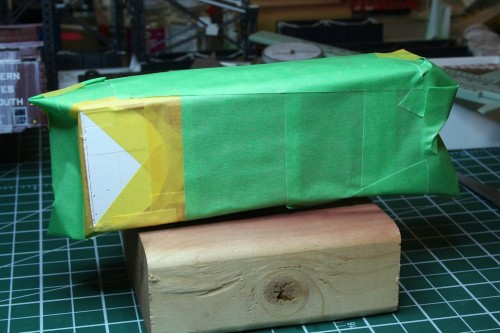Earlier this week, Atlas Model Railroad Co. posted their 2014 All-Scales Catalog. Inside the HO Scale Announcements section is an interesting item for Algoma Central fans: Algoma Central is one of the roadnames in the next upcoming release of their TrainMan series GP38-2.
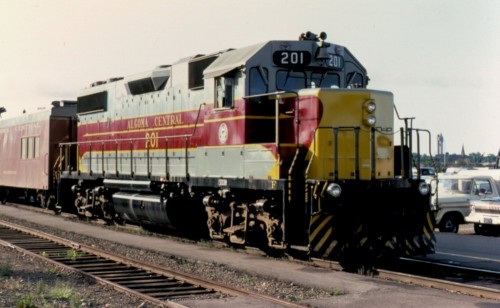
AC 201 at Sault Ste. Marie in September 1982. Francis J. Wiener photo, Chris van der Heide collection.
Several years ago, Canadian Hobbycraft had sponsored a custom run of GP38-2s in various Canadian paint schemes including less common shortlines like RaiLink and Algoma Central. These were produced using the Life-Like Proto2000 GP38-2. Of course this limited run has long been out of production, and while one or two might pop up on the secondhand market occasionally, new ones just aren’t available anymore.
The new Atlas model is in the TrainMan series, which is Atlas’s more “entry level” line; the model will have the same proven drive train as Atlas’s higher end “Master Series” but the body may have less of the fine detail, and it most likely won’t have the road-specific details like snowplow, nose headlight, cab front bell, single rear headlight, Canadian-style vertical steps etc. However this will still be a good enough stand in for most, and a good starting point for detailing for many others.
They currently list road numbers 200 and 202, although this could potentially still change before production. The prototype locomotives were built in 1981 by General Motors Diesel Division in London, ON as series AC 200-205. Most or all of them are still operating today (just not in ACR colours) as WC 2001-2006.
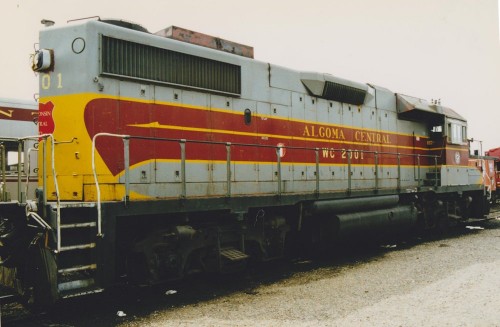
WC 2001 (ex-AC 200) at Steelton Yard before repainting into WC colours. Blair Smith photo.
Part of the ad copy in the catalog indicates matching cabooses will be available, and indeed, further down is a section with new paint schemes on the TrainMan series “steel cupola caboose”, including Algoma Central. Of course this model is based on a small north-eastern US prototype that isn’t remotely similar to any ACR cabooses. The catalog outline artwork shows a caboose numbered AC 9607; this number would correspond to one of the three ex-CP vans acquired in 1992-93. Rapido Trains produced a model of this caboose several years ago. Highball Graphics also has some ACR caboose decals that can be used to custom paint something a bit better than the TrainMan caboose into ACR colours.
One other announcement in the catalog which will be of significant interest to most Canadian modelers is not too much of a surprise: a new version of their 50′ NSC boxcar matching the features of cars owned by Canadian Pacific and Ontario Northland. (Previously they have run Canadian National and British Columbia Railway versions.)

CP (ex-CPI) 85718 newsprint service boxcar. Jurgen Kleylein photo.
The first run of this version contains three paint schemes: Ontario Northland (7700-7799 series), Canadian Pacific (CPI 85635-85734 series) and Quebec Central/CP* (QC 75100-75299 series). All of the paint schemes represent original factory paint jobs, and future releases of other CP repainted cars are likely in subsequent runs.
* Note: The outline graphics in the catalog show the QC cars as an apparent ex-CP patch job; I checked with Atlas and this is not how the actual cars will be decorated. They will properly represent the as-built appearance of the QC cars, which were built new with QC reporting marks and CP colours. (Quebec Central was a CP subsidiary absorbed in the 1930s. CP re-used the marks in the late 1970s as a method to have empty paper service boxcars routed back to eastern Canada by other roads.)
Build dates for the prototype cars represented by the model are as follows:
| Series |
Build Date |
Qty. |
Note |
| CPI 85635-85734 * # |
9-10/77 |
100 |
re# CP /78-/83 |
| ONT 7600-7629 |
11/77 |
30 |
|
| ONT 7700-7799 * |
9/80 |
100 |
|
| QC 75000-75099 |
11-12/79 |
100 |
|
| QC 75100-75299 * |
7-8/80 |
200 |
|
| QGRY 75000-75299 $ |
11-12/79, 7-8/80 |
81 |
ex-QC /98 |
* – Series represented by Atlas
# – Previous series CPI 85500-85634 (Built 3-5/75, 135 cars) are similar but have 10′ wide doors (vs. 9′ doors on all of the other above) and non-cushioned underframes
$ – QGRY series is non-inclusive.
Some woodpulp/paper traffic from mills on the CPR line on the north shore of Lake Superior routed over the ACR from the interchange at Franz (that’s a subject I may attempt to cover in more detail sometime in a dedicated post), and there’s evidence that some paper from the Ontario Northland (from mills at Iroquois Falls, and likely from Kapuskasing and Smooth Rock Falls following the takeover of the ex-CN Kapuskasing subdivision) so any of these cars would not be out of place on a period ACR layout. I’ll be getting a couple of these cars for sure to mix into my CP woodpulp/paper fleet.

